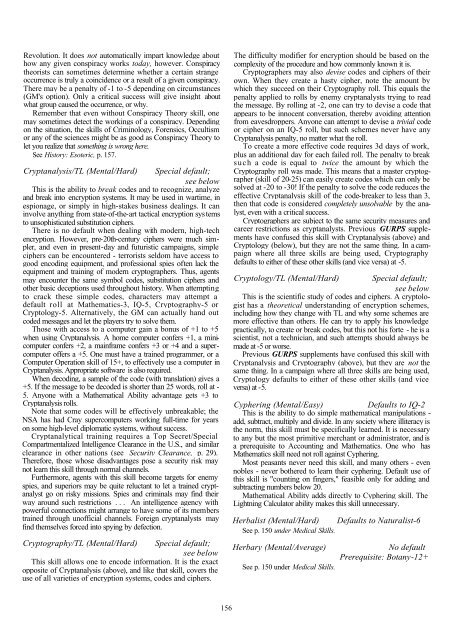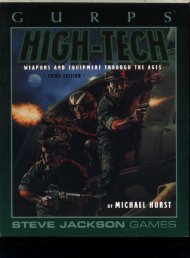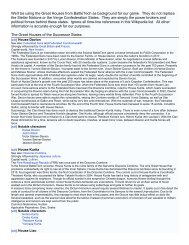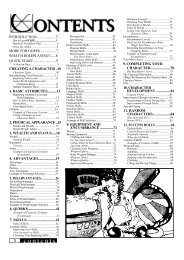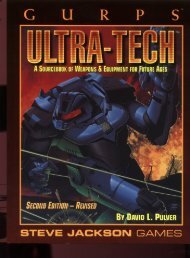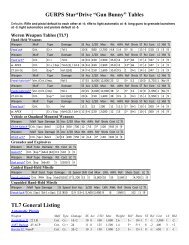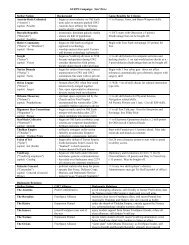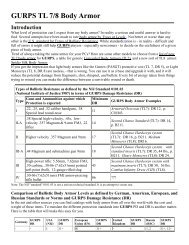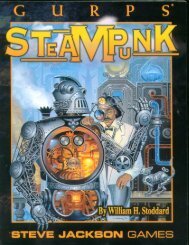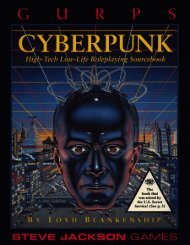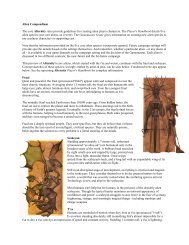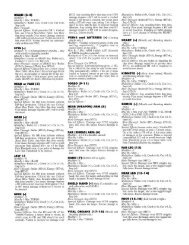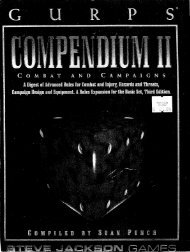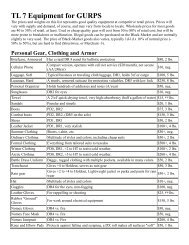GURPS - Compendium 1..
GURPS - Compendium 1..
GURPS - Compendium 1..
You also want an ePaper? Increase the reach of your titles
YUMPU automatically turns print PDFs into web optimized ePapers that Google loves.
Revolution. It does not automatically impart knowledge about<br />
how any given conspiracy works today, however. Conspiracy<br />
theorists can sometimes determine whether a certain strange<br />
occurrence is truly a coincidence or a result of a given conspiracy.<br />
There may be a penalty of -1 to -5 depending on circumstances<br />
(GM's option). Only a critical success will give insight about<br />
what group caused the occurrence, or why.<br />
Remember that even without Conspiracy Theory skill, one<br />
may sometimes detect the workings of a conspiracy. Depending<br />
on the situation, the skills of Criminology, Forensics, Occultism<br />
or any of the sciences might be as good as Conspiracy Theory to<br />
let you realize that something is wrong here.<br />
See History: Esoteric, p. 157.<br />
Cryptanalysis/TL (Mental/Hard) Special default;<br />
see below<br />
This is the ability to break codes and to recognize, analyze<br />
and break into encryption systems. It may be used in wartime, in<br />
espionage, or simply in high-stakes business dealings. It can<br />
involve anything from state-of-the-art tactical encryption sys tems<br />
to unsophisticated substitution ciphers.<br />
There is no default when dealing with modern, high-tech<br />
encryption. However, pre-20th-century ciphers were much simpler,<br />
and even in present-day and futuristic campaigns, simple<br />
ciphers can be encountered - terrorists seldom have access to<br />
good encoding equipment, and professional spies often lack the<br />
equipment and training of modern cryptographers. Thus, agents<br />
may encounter the same symbol codes, substitution ciphers and<br />
other basic deceptions used throughout history. When attempting<br />
to crack these simple codes, characters may attempt a<br />
default roll at Mathematics-3, IQ-5, Cryptography-5 or<br />
Cryptology-5. Alternatively, the GM can actually hand out<br />
coded messages and let the players try to solve them.<br />
Those with access to a computer gain a bonus of +1 to +5<br />
when using Cryptanalysis. A home computer confers +1, a minicomputer<br />
confers +2, a mainframe confers +3 or +4 and a supercomputer<br />
offers a +5. One must have a trained programmer, or a<br />
Computer Operation skill of 15+, to effectively use a computer in<br />
Cryptanalysis. Appropriate software is also required.<br />
When decoding, a sample of the code (with translation) gives a<br />
+5. If the message to be decoded is shorter than 25 words, roll at -<br />
5. Anyone with a Mathematical Ability advantage gets +3 to<br />
Cryptanalysis rolls.<br />
Note that some codes will be effectively unbreakable; the<br />
NSA has had Cray supercomputers working full-time for years<br />
on some high-level diplomatic systems, without success.<br />
Cryptanalytical training requires a Top Secret/Special<br />
Compartmentalized Intelligence Clearance in the U.S., and similar<br />
clearance in other nations (see Security Clearance, p. 29).<br />
Therefore, those whose disadvantages pose a security risk may<br />
not learn this skill through normal channels.<br />
Furthermore, agents with this skill become targets for enemy<br />
spies, and superiors may be quite reluctant to let a trained cryptanalyst<br />
go on risky missions. Spies and criminals may find their<br />
way around such restrictions ... An intelligence agency with<br />
powerful connections might arrange to have some of its members<br />
trained through unofficial channels. Foreign cryptanalysts may<br />
find themselves forced into spying by defection.<br />
Cryptography/TL (Mental/Hard) Special default;<br />
see below<br />
This skill allows one to encode information. It is the exact<br />
opposite of Cryptanalysis (above), and like that skill, covers the<br />
use of all varieties of encryption systems, codes and ciphers.<br />
The difficulty modifier for encryption should be based on the<br />
complexity of the procedure and how commonly known it is.<br />
Cryptographers may also devise codes and ciphers of their<br />
own. When they create a hasty cipher, note the amount by<br />
which they succeed on their Cryptography roll. This equals the<br />
penalty applied to rolls by enemy cryptanalysts trying to read<br />
the message. By rolling at -2, one can try to devise a code that<br />
appears to be innocent conversation, thereby avoiding attention<br />
from eavesdroppers. Anyone can attempt to devise a trivial code<br />
or cipher on an IQ-5 roll, but such schemes never have any<br />
Cryptanalysis penalty, no matter what the roll.<br />
To create a more effective code requires 3d days of work,<br />
plus an additional day for each failed roll. The penalty to break<br />
such a code is equal to twice the amount by which the<br />
Cryptography roll was made. This means that a master cryptographer<br />
(skill of 20-25) can easily create codes which can only be<br />
solved at -20 to -30! If the penalty to solve the code reduces the<br />
effective Cryptanalysis skill of the code-breaker to less than 3,<br />
then that code is considered completely unsolvable by the analyst,<br />
even with a critical success.<br />
Cryptographers are subject to the same security measures and<br />
career restrictions as cryptanalysts. Previous <strong>GURPS</strong> supplements<br />
have confused this skill with Cryptanalysis (above) and<br />
Cryptology (below), but they are not the same thing. In a campaign<br />
where all three skills are being used, Cryptography<br />
defaults to either of these other skills (and vice versa) at -5.<br />
Cryptology/TL (Mental/Hard) Special default;<br />
see below<br />
This is the scientific study of codes and ciphers. A cryptologist<br />
has a theoretical understanding of encryption schemes,<br />
including how they change with TL and why some schemes are<br />
more effective than others. He can try to apply his knowledge<br />
practically, to create or break codes, but this not his forte - he is a<br />
scientist, not a technician, and such attempts should always be<br />
made at -5 or worse.<br />
Previous <strong>GURPS</strong> supplements have confused this skill with<br />
Cryptanalysis and Cryptography (above), but they are not the<br />
same thing. In a campaign where all three skills are being used,<br />
Cryptology defaults to either of these other skills (and vice<br />
versa) at -5.<br />
Cyphering (Mental/Easy)<br />
Defaults to IQ-2<br />
This is the ability to do simple mathematical manipulations -<br />
add, subtract, multiply and divide. In any society where illiteracy is<br />
the norm, this skill must be specifically learned. It is necessary<br />
to any but the most primitive merchant or administrator, and is<br />
a prerequisite to Accounting and Mathematics. One who has<br />
Mathematics skill need not roll against Cyphering.<br />
Most peasants never need this skill, and many others - even<br />
nobles - never bothered to learn their cyphering. Default use of<br />
this skill is "counting on fingers," feasible only for adding and<br />
subtracting numbers below 20.<br />
Mathematical Ability adds directly to Cyphering skill. The<br />
Lightning Calculator ability makes this skill unnecessary.<br />
Herbalist (Mental/Hard) Defaults to Naturalist-6<br />
See p. 150 under Medical Skills.<br />
Herbary (Mental/Average)<br />
See p. 150 under Medical Skills.<br />
No default<br />
Prerequisite: Botany-12+<br />
156


